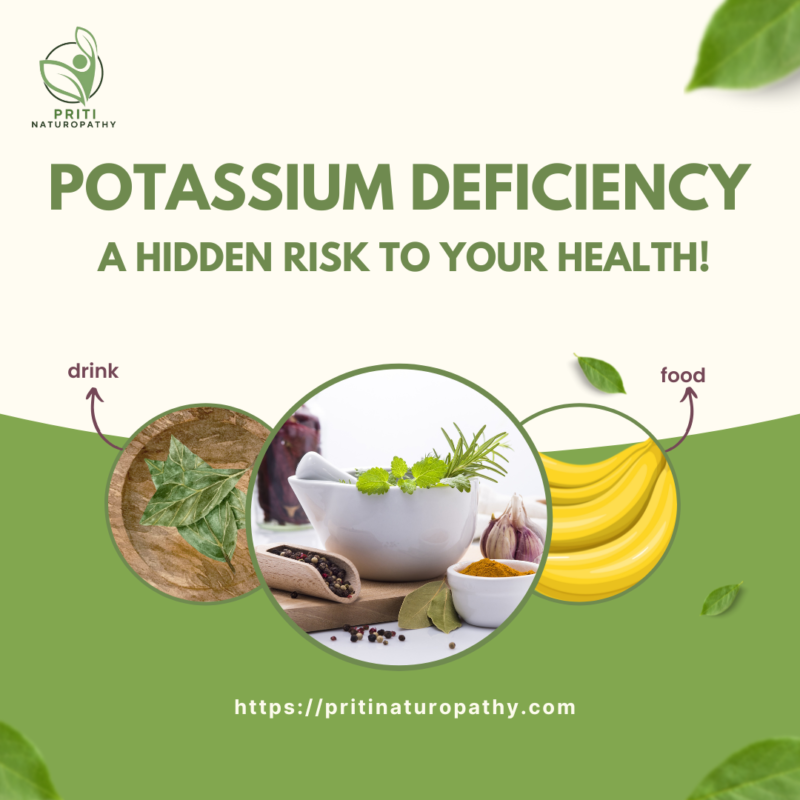Introduction
Potassium is an essential mineral and electrolyte that plays a crucial role in various body functions, including muscle contractions, nerve signaling, and maintaining a healthy heart rhythm.
Many people suffer from potassium deficiency which can lead to several health complications. The human body requires a balanced level of potassium to function properly, and its deficiency can result in muscle weakness, fatigue, and even severe medical conditions. Deficiency of potassium also causes stress, which is why people suffering from stress are often advised to consume black salt and bananas.
The Importance of Potassium in the Body
Potassium helps in:
- Regulating muscle contractions and relax properly, preventing cramps and weakness.
- Maintaining nerve function and allowing communication between the brain and muscles.
- Potassium helps maintain the body’s fluid balance and regulates blood pressure by counteracting the effects of sodium.
- It ensures proper heart function by maintaining a steady heartbeat and reducing the risk of cardiovascular diseases.
Reasons Of Potassium Deficiency
- Not consuming enough potassium-rich foods such as bananas, spinach, sweet potatoes, and avocados can lead to deficiency.
- Excessive loss of potassium, this can occur due to prolonged vomiting, diarrhea, excessive sweating, or kidney disease.
- Certain medications, such as diuretics can increase the urination which lead to potassium loss.
- High stress levels can affect the body’s ability to retain potassium, leading to depletion over time.
Symptoms of Potassium Deficiency
Weakness and Muscle Fatigue
One of the most common signs of potassium deficiency is muscle weakness. Since potassium plays a crucial role in muscle function, low levels can cause frequent cramps, stiffness, and weakness in the muscles. People who engage in physical activity or exercise may find it difficult to perform due to increased fatigue. If you experience frequent muscle pain and stiffness, it may be due to a potassium deficiency in your body.
Numbness and Tingling Sensations
Persistent numbness and tingling in body parts, especially the hands and feet, can be a sign of potassium deficiency. This happens because potassium helps in transmitting nerve signals, and its deficiency can disrupt normal nerve function.
Rapid or Irregular Heartbeat
A deficiency of potassium can affect heart muscles, leading to irregular heartbeats (arrhythmia) or palpitations. Since potassium is responsible for maintaining the heart’s electrical activity, a deficiency can increase the risk of heart disease and high blood pressure.
Frequent Fatigue and Drowsiness
If you constantly feel tired or exhausted, it may indicate low potassium levels. Potassium helps cells produce energy, and a deficiency can lead to chronic fatigue and drowsiness, even after getting enough sleep.
High Blood Pressure and Dizziness
Low potassium levels can cause blood vessels to constrict, leading to high blood pressure. Additionally, poor circulation to the brain may result in dizziness, confusion, and an increased risk of fainting.
Muscle Cramps and Stiffness
Potassium is crucial for maintaining muscle flexibility and strength. Its deficiency can lead to frequent muscle cramps, especially in the legs and arms. People suffering from potassium deficiency often experience unexplained stiffness and discomfort after physical activity.
Constipation and Digestive Issues
Potassium helps in muscle contractions of the digestive tract. When potassium levels drop, the intestines may not function properly, leading to constipation and bloating.
Mood Changes and Mental Stress
Many studies shows that potassium deficiency is linked to mental stress, anxiety, and depression. People with low potassium levels may experience mood swings, irritability, and difficulty concentrating. Prolonged potassium deficiency can cause mental stress, anxiety, and even depression in some cases.
How to Prevent Potassium Deficiency
The best way to prevent potassium deficiency is by maintaining a balanced diet that includes potassium-rich foods. Foods that are good source of potassium:
- Bananas – A well-known source of potassium that helps maintain energy levels.
- Spinach and leafy greens – Packed with potassium and other essential minerals.
- Avocados – Rich in healthy fats and potassium.
- Sweet potatoes – A great option for maintaining potassium levels while providing essential fiber.
- Coconut water – A natural source of electrolytes that helps in hydration and maintaining potassium balance.
- Black salt – Often recommended for people suffering from stress-related potassium deficiency.
Conclusion
Potassium is an essential nutrient that plays a vital role in overall health. Its deficiency can lead to muscle weakness, heart irregularities, mental stress, and other serious healthconditions. A well-balanced diet rich in potassium can help prevent these issues and maintain optimal health. If you suspect a potassium deficiency, take the necessary steps to incorporate potassium-rich foods into your diet and consult a healthcare professional if needed.
By making small changes to your diet and lifestyle, you can ensure that your body receives the required amount of potassium, keeping you healthy and active.


Leave a Reply